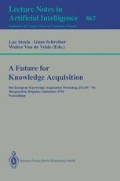Abstract
Problem-solving systems, situated in the real world are faced with a great challenge, that is, the dynamic nature of their environment. In any realistic environment the state of the world changes, and therefore, the system's knowledge about the world often becomes incomplete and incorrect. Furthermore, the constraints and the requirements imposed on the system's behavior may also evolve, and as a result, the system's functional architecture may become insufficient to meet the requirements of the evolving task environment. In principle, we would like our systems to be able to adjust themselves in their environments and to sustain quality performance across such environmental changes. To enable a system with the capability of self-adaptation, we have developed a framework for endowing it with the competence of reflection. In this framework, the system's problem-solving behavior is modeled in terms of a SBF model. This model captures a deep comprehension of the system's task structure, world knowledge and their inter-dependencies. The knowledge captured in the SBF model of a system enables it, when it fails, to identify the need to update its world knowledge and also appropriately redesign its functional architecture.
This work has been supported by the National Science Foundation (research grant IRI-92-10925), the Office of Naval Research (research contract N00014-92-J-1234), and the Advanced Projects Research Agency. In addition, Stroulia's work has been supported by an IBM graduate fellowship.
Preview
Unable to display preview. Download preview PDF.
References
D. Allemang: Understanding Programs as Devices, PhD Thesis, The Ohio State University (1990)
B. Chandrasekaran: Towards a functional architecture for intelligence based on generic information processing tasks. In Proceedings of Tenth International Joint Conference on Artificial Intelligence, 1183–1192, Milan (1987)
B. Chandrasekaran: Task Structures, Knowledge Acquisition and Machine Learning. Machine Learning 4: 341–347 (1989)
W.J. Clancey: Heuristic Classification, Artificial Intelligence 27: 289: 350 (1985)
R. Davis: Interactive transfer of expertise: Acquisition of new inference rules, Artificial Intelligence 12: 121–157 (1977)
R. Davis: Meta-Rules: Reasoning about Control. Artificial Intelligence 15: 179–222 (1980)
J.S. Gero, H.S. Lee and K.W. Tham: Behaviour: A Link between Function and Structure in Design, In Proceedings IFIP WG5.2 Working Conference on Intelligent CAD, pp. 201–230. (1991)
A. Goel: Integration of Case-Based Reasoning and Model-Based Reasoning for Adaptive Design Problem Solving, PhD Thesis, The Ohio State University (1989)
A. Goel: A Model-Based Approach to Case Adaptation. In Proceedings of the Thirteenth Annual Conference of the Cognitive Science Society, Chicago, August 7–10, pp. 143–148 (1991)
A. Goel, T. Callantine, M. Shankar, B. Chandrasekaran: Representation, Organization, and Use of Topographic Models of Physical Spaces for Route Planning. In Proceedings of the Seventh IEEE Conference on AI Applications. 308–314, IEEE Computer Society Press (1991)
A. Goel, T. Callantine: An Experience-Based Approach to Navigational Route Planning. In Proceedings of the IEEE/RSJ International Conference on Intelligent Robotics and Systems (1992)
K. Johnson: Exploiting a Functional Model of Problem Solving for Error Detection in Tutoring, PhD Thesis, The Ohio State University (1993)
D. Marcques, G. Dallemagne, G. Klinker, J. McDermott, D. Tung: Easy Programming: Empowering people to build their own applications. IEEE Expert, June 1992, 16–29.
J. McDermott: Preliminary steps toward a taxonomy of problem-solving methods, In Sandra Marcus (ed.): Automating Knowledge Acquisition for Expert Systems, Kluwer Academic Publishers (1988)
M. Minsky: Steps Towards Artificial Intelligence. In Feigenbaum and Feldman (eds): Computers and Thought, McGraw-Hill, New York. (1963)
S. Minton: Qualitative results concerning the utility of explanation-based learning. Artificial Intelligence 42: 363–392 (1990)
T.M. Mitchell, P.E. Utgoff, B. Nudel, R.B. Banerji Learning problem-solving heuristics through practice. In Proceedings of the Seventh International Joint Conference on AI 127–134 (1981)
A. Samuel: Some studies in machine learning using the game of checkers. IBM Journal of RD. (1959) Reprinted in Feigenbaum and Feldman (eds.): Computers and Thought (1963)
R.G. Simmons: Combining Associational Causal Reasoning to Solve Interpretation and Planning Problems, MIT Report 1048.(1988)
J.G. Sussman: A Computational Model of Skill Acquisition, American Elsevier, New York, (1975)
L. Steels: Components of Expertise. AI Magazine 11: 30–49 (1990).
E. Stroulia and A. Goel: Generic Teleological Mechanisms and their Use in Case Adaptation. In the Proceedings of the Fourteenth Annual Conference of the Cognitive Science Society, pp. 319–324. (1992)
E. Stroulia, A. Goel: Functional Representation and Reasoning for Reflective Systems. Applied Artificial Intelligence: An International Journal (to appear). (1993)
Y. Umeda, H. Takeda, T. Tomiyama, H. Yoshikawa: Function, Behaviour, and Structure. In Gero (ed.): Applications of Artificial Intelligence in Engineering, vol 1, Design, Proceedings of the Fifth International Conference, Springer-Verlag, Berlin, pp. 177–193. (1990)
M. Weintraub: An Explanation-Based Approach to Assigning Credit, PhD Thesis, The Ohio State University (1991)
B.J. Wielinga, A.Th. Schreiber, J.A. Breuker: KADS: A modelling approach to knowledge engineering. In Knowledge Acquisition 4(1). Special issue “The KADS approach to knowledge engineering” (1992)
R. Wilensky: Planning and Understanding, A Computational Approach to Human Reasoning. Addison Wesley. (1983)
Author information
Authors and Affiliations
Editor information
Rights and permissions
Copyright information
© 1994 Springer-Verlag Berlin Heidelberg
About this paper
Cite this paper
Stroulia, E., Goel, A.K. (1994). Reflective, self-adaptive problem solvers. In: Steels, L., Schreiber, G., Van de Velde, W. (eds) A Future for Knowledge Acquisition. EKAW 1994. Lecture Notes in Computer Science, vol 867. Springer, Berlin, Heidelberg. https://doi.org/10.1007/3-540-58487-0_21
Download citation
DOI: https://doi.org/10.1007/3-540-58487-0_21
Published:
Publisher Name: Springer, Berlin, Heidelberg
Print ISBN: 978-3-540-58487-2
Online ISBN: 978-3-540-49006-7
eBook Packages: Springer Book Archive

